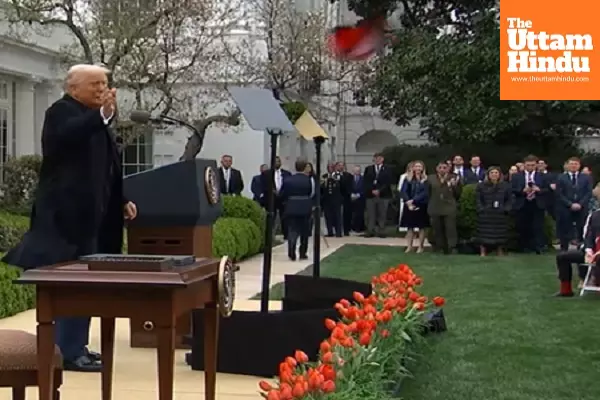
Trump's 'reciprocal' tariffs on South Korea, other countries, take effect

Washington(The Uttam Hindu): The United States' reciprocal tariffs, including 25 per cent duties for South Korea, went into effect on Wednesday, as America's trading partners are seeking to negotiate a deal to reduce tariff rates and minimise the potential impact of President Donald Trump's trade policy on their economies.
The reciprocal tariffs on nearly 60 countries took effect despite lingering concerns that new U.S. duties could lead to higher inflation and slower economic growth. Trump has been using tariffs to increase federal government revenue, reduce the U.S.' trade deficits and boost domestic manufacturing, reports Yonhap news agency.
Last Wednesday, Trump unveiled a minimum 10 percent "baseline" tariff, which went into effect Saturday, as well as the reciprocal tariffs on what his administration called "the worst offenders," including South Korea, Japan and China. The U.S. imposed 24 percent reciprocal tariffs on Japan, 32 percent on Taiwan, 20 percent on the European Union, 49 percent on Cambodia and 46 percent on Vietnam, to name a few.
For China, the Trump administration said the combined tariff rate for the Asian superpower jumped to 104 percent. The U.S. initially unveiled a 34 percent reciprocal tariff for China on top of its separate 20 percent levies on Chinese imports. It later announced an additional 50 percent tariff as China said it will slap a 34 percent retaliatory tariff on U.S. goods. Some goods are not subject to reciprocal tariffs, including steel, aluminium, automobiles and key auto parts -- the targets of the already announced industry-specific tariffs, according to the White House.
The country-by-country tariffs were customised based on trading partners' tariff- and non-tariff barriers, as well as other factors, such as countries' exchange rate-related policies and practices, U.S. officials said. Meanwhile, South Korea said it will prioritise efforts to lower tariff rates in upcoming negotiations with the United States.
The remarks came after acting President Han Duck-soo's first phone call with US President Trump on Tuesday, during which they discussed a wide range of issues, including tariffs, shipbuilding and potential energy deals, security and North Korea.
"As high-level talks have taken place, we will now prepare concrete proposals and begin negotiations on individual issues with relevant trade authorities," the official from the Prime Minister's Office told reporters. "Our foremost goal is to adjust (U.S.) tariff rates."
South Korea's trade minister is traveling to Washington to meet U.S. Trade Representative Jamieson Greer for tariff negotiations. Trump described the call with Han as "great," saying the two leaders touched on several key topics, including trade, the purchase of liquefied natural gas, a pipeline project in Alaska, shipbuilding cooperation and defence cost-sharing for the U.S. Forces Korea.

